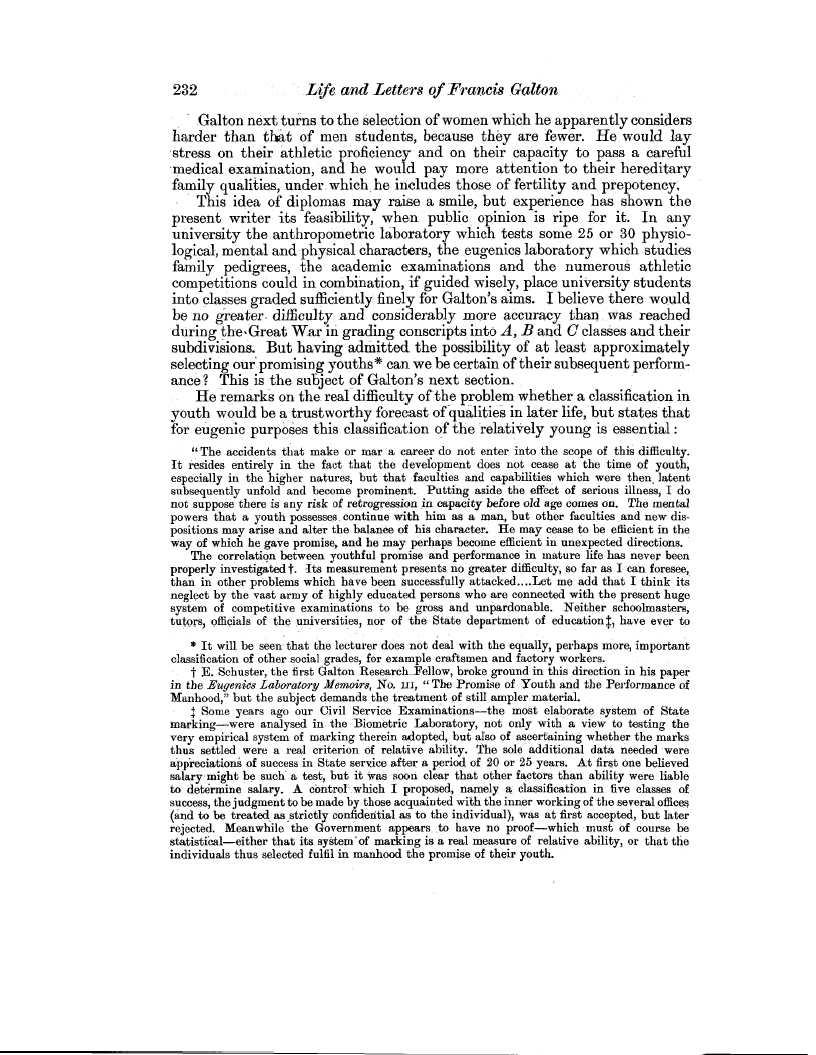| ||||||

OCR Rendition - approximate
232 Life. and Letters of Francis Galton Galton next turns to the selection of women which he apparently considers harder than that of men students, because they are fewer. He would lay `stress on their athletic proficiency and on their capacity to pass a careful `medical examination, and he would pay more attention to their hereditary family qualities, under which, he includes those of fertility and prepotency. This idea of diplomas may raise a smile, but experience has shown the present writer its feasibility, when public opinion is ripe for it. In any university the anthropometric laboratory which tests some 25 or 30 physiological, mental and-physical characters, the eugenics laboratory which studies family pedigrees, the academic examinations and the numerous athletic competitions could in combination, if guided wisely, place university students into classes graded sufficiently finely for Galton's aims. I believe there would be no greater, difficulty and considerably more accuracy than was reached during the, Great War in grading conscripts into A, B and C classes and their subdivisions. But having admitted the possibility of at least approximately selecting our promising youths* can we be certain of their subsequent performance? This is the subject of Galton's next section. He remarks on the. real difficulty of the problem whether a classification in youth would be a trustworthy forecast of qualities in later life, but states that for eugenic purposes this classification of the relatively young is essential "The accidents that make or mar a career do not enter into the scope of this difficulty. It resides entirely in the fact that the development does not cease at the time of youth, especially in the higher natures, but that faculties and capabilities which were then latent subsequently unfold and become prominent. Putting aside the effect of serious illness, I do not suppose there is any risk of retrogression in capacity before old age comes on. The mental powers that a youth possesses, continue with him as a man, but other faculties and new dispositions may arise and alter the balance of his character. He may cease to be efficient in the way of which he gave promise, and he may perhaps become efficient in unexpected directions. The correlation between youthful promise and performance in mature life has never been properly investigated t. Its measurement presents no greater difficulty, so far as I can foresee, than in other problems which have been successfully attacked .... Let me add that I think its neglect by the vast army of highly educated persons who are connected with the present huge system of competitive examinations to be gross and unpardonable. Neither schoolmasters, tutors, officials of the universities, nor of the State department of educationl, have ever to It will be seen that the lecturer does not deal with the equally, perhaps more, important classification of other social grades, for example craftsmen and factory workers. t E. Schuster, the first Galton Research-Fellow, broke ground in this direction in his paper in the Eugenics Laboratory Memoirs, No. ui, " The Promise of Youth and the Performance of Manhood," but the subject demands the treatment of still ampler. material. + Some years ago our Civil Service Examinations-the most elaborate system of State marking-were analysed in the Biometric Laboratory, not only with a view to testing the very empirical system of marking therein adopted, but also of ascertaining whether the marks thus settled were a real criterion of relative ability. The sole additional data needed were appreciations of success in State service after a period of 20 or 25 years. At first one believed salary-might be such a test, but it was soon clear that other factors than ability were liable to determine salary. A control' which I proposed, namely a_ classification in five classes of success, the judgment to be made by those acquainted with the inner working of the several offices (and to be treated as strictly confidential as to the individual), was at first accepted, but later rejected. Meanwhile the Government appears to have no proof-which must of course be statistical-either that its system' of marking is a real measure of relative ability, or that the individuals thus selected fulfil in manhood the promise of their youth.
|